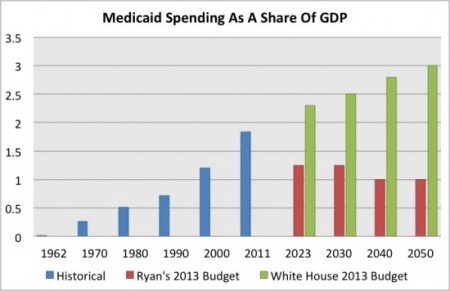Vice-President Joe Biden and vice-presidential candidate Paul Ryan covered a lot of ground in last night’s debate. But one program that didn’t come up is Medicaid, the joint state-federal program that provides health coverage to 31 million children, 1.9 million seniors, and millions of other disabled and low-income Americans. It’s worth correcting the omission because Ryan’s plans for Medicaid, laid out in the budget he engineered for the House Republicans, are arguably even more radical than his well-known plans for Medicare:
Ryan transforms Medicaid into a block grant. Right now, both the states and the federal government must provide the funding to meet the benefits outlined in the Medicaid program. Block grants would change the federal contribution into an annual lump sum, leaving state budgets to make up the shortfall in times of economic hardship. Other countries’ block grant programs appear to work well, but their history in American politics is not encouraging. In the case of welfare reform, which Ryan often touts as a model, funding was sometimes diluted and states often failed to meet families’ increased needs during the depression.
Ryan cuts Medicaid by a third in ten years. While he tends to focus on the block grants in defending his Medicaid plans, this is what hides behind them: A hard cut to how much the federal government will provide the program, by about $810 billion over ten years. The rates at which Medicaid reimburses health care providers are already extremely low, meaning the cuts will probably come out of the eligibility roles. The Center on Budget and Policy Priorities estimated this would kick 14 to 27 million people off Medicaid, depending on how the cuts are carried out. Another 17 million people who gained coverage under Obamacare would also lose it if Ryan repealed that law, as he says he would. And on top of all that, Ryan’s cuts to Medicaid go even deeper beyond the ten year window:

Ryan’s cuts harm current seniors. He’s often defended his alterations to Medicare by claiming the changes won’t harm current seniors. He has no such out for his Medicaid cuts. 1.9 million seniors rely on Medicaid to support their long-term care, and under Ryan’s plan they would immediately start seeing losses to their benefits in the realm of $2,500 a year.
Ryan offers Orwellian justifications for these cuts. His own budget scolds current Medicaid for its extremely stingy reimbursement rates, which drive away providers and risk the health of Medicaid’s enrollees. But to offer further cuts and the “efficiencies” of block grants as the solution is perverse. Medicaid’s provider payment rates are already a third lower than Medicare’s, and even further below those of private insurers. Ryan admits improper payments within Medicaid are only 10 percent of its budget, so even if all these inefficiencies were eliminated and the reclaimed funds plowed into reimbursement rates, Medicaid would still be well below Medicare’s rates — and that’s before accounting for the new cuts. Ryan also criticizes Medicaid for a spending trajectory that’s unsustainable over the long-term. That’s a fair point, but this is because Medicaid must keep up with rising health care costs in order to keep fulfilling its role in the social safety net. The bluntness and extraordinary size of Ryan’s cuts completely ignore these complexities.
It’s also worth mentioning that Mitt Romney’s budget plan, which Ryan must now defend as part of the ticket, is less detailed, but arguably even worse. By keeping government spending under 20 percent of GDP, while holding defense at 4 percent, and not touching Medicare or Social Security, Romney would force a 40 percent cut in every other program — including Medicaid — by 2022.
Update:
This post originally stated that Medicaid “provides health coverage to 63 million children.” 63 million is in fact the total size of Medicaid’s enrollee population. 31 million are children. We regret the error.
